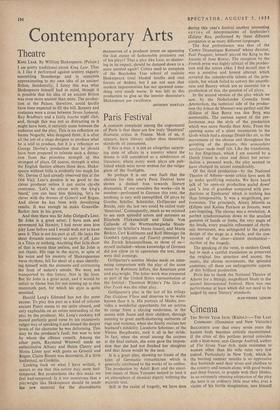Paris Festival
A Comm complaint among the cognoscenti of Paris is that there are few truly 'theatrical' dramatic critics in France. Most of us, it appears, have literary rather than theatrical standards of assessment.
If this is true, it is not an altogether surpris- ing state of affairs in a country where the drama is still considered as a subdivision of literature; where every week plays are pub- lished which were never written for the vulgar glare of the footlights.
So perhaps it is our own fault that the choices for this year's Paris Festival have shown a distinct bias towards literary dramatists. If one considers the works—six in number—performed in German this year, the tendency is very well exemplified. Of plays by Goethe, Schiller, Schnitzler, Grillparzer and Brecht, only the last two could be called truly 'theatrical.' Consequently, much as we rejoiced to see such splendid actors and actresses as Elisabeth Flickenschildt and Gisela Von Collande of the Wurttembergische Staats- theater (in Schiller's Maria Stuart), and Maria Becker, Carl Kuhlmann and Rolf Henniger (in Goethe's Iphigenie auf Tauris) presented by the Zurich Schauspielhaus, to those of us— myself included—whose knowledge of German did not allow us to appreciate the text, these were dull evenings.
Grillparzer's sombre Medea made an inter- esting comparison with the play of the same name by Robinson Jeffers, the American poet and playwright. The latter work was presented as part of the United States representation at the festival : Thornton Wilder's The Skin of Our Teeth was the other play.
Grillparzer's play is the last of his trilogy Das Goldene Vliess and deserves to be wider known than it is. His portrait of Medea pro- vides a wonderful opportunity for an actress to range from a cloying tenderness, in the scenes with Jason and their children, through cunning to great earth-shattering outbursts of rage and violence, when she finally realises her husband's infidelity, Lieselotte Schreiner, of the Vienna Burgtheater, took it all in her stride. In fact, when she stood among the corpses at the final curtain, she even gave the impres- sion that she had not finished her slaughter and that Jason would be the next.
It is a great play, showing no traces of the taint of Germanic romanticism which is generally attributed to the works of its author. The production by Adolf Rott and the excel- lent music of Hans Totzauer helped to lend it an atmosphere of classical dignity befitting the majestic text.
Still in the realm of tragedy, we have seen during this year's festival another interesting series of . interpretations of Sophocles's Edipus Rex, performed by three different companies in as many different languages.
The first performance was that of the 'Centre Dramatique Romand' whose director, Paul Pasquier, himself played the King to the Jocasta of Jane Rosier. The reception by the French press was highly critical of the produc- tion and the actors alike. I find myself that it was a sensitive and honest attempt which revealed the considerable talents of the prin- cipals, but which failed to convey the smooth- ness and fluency which are so essential for a production of this, the greatest of all plays.
In the second version of the play which we
saw, by the Nederlandse Comedie from Amsterdam, the technical side of the produc- tion (by Johan de Meester) was perfect and the CEdipus of Han Bentz van den Berg was memorable. The curious aspect of the per- formance was the style of the production which was more Nordic than Attic. From the opening scene of a silent incantation to the Gods which had a strange Druid-like air, to the movements of the chorus and throughout the grouping of the players, this atmosphere nordique made itself felt. Like the translation, by Jan Engelman, which I am assured by a Dutch friend is clear and direct but never- theless a personal work, the play seemed to have changed its accent considerably.
Of the third production—by the National Theatre of Athens—some critics have seen fit to make qualifying remarks. We have heard talk of 'an open-air production scaled down' and 'a loss of grandeur compared with pro- ductions at Epidaurus' which is nothing less than irresponsible. It was a magnificent per- formance. The principals, Alexis Minotis as CEdipus and Katina Paxinou as Jocasta, were awe-inspiring. The chorus was a revelation. A perfect synchronisation down to the smallest gestures of hands or limbs, the very angle of the heads, every possible refinement of rhyth- mic movement, was subjugated to the plastic design of the stage as a whole, and the con- veyance of the clear—almost mechanical— rhythm of the tragedy.
The speaking of the verse, in modern Greek but in such a careful translation as preserved the original line structure and accent, the music, the chorus movements, the splendid costumes, all these are unforgettable aspects of this brilliant production.
Paris has to thank the National Theatre of Athens for a fittingly magnificent finale to the second International Festival. Here was one performance at least which did not need to be judged by mere 'literary' standards.
JEAN-PIERRE LENOIR


































 Previous page
Previous page